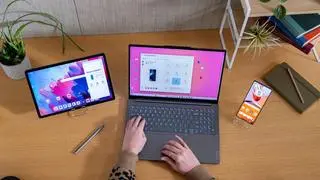More people in India use connected devices like mobile phones and PCs for educational and professional purposes compared to those in developed markets such as the US and Japan, a study by IT firm Juniper Networks said on Monday.
According to Juniper’s Global Bandwidth Index Report, 45 per cent of respondents from India said connectivity has fundamentally changed how they access textbooks, complete coursework or use teaching tools compared with just seven per cent in Japan.
Among the nine nations surveyed, India ranks second behind South Africa in the use of connected devices for professional and personal usage.
The report surveyed 5,500 adults in developed markets like Australia, Germany, Japan, the UK and the US as well as emerging markets like Brazil, China, India and South Africa.
The study, commissioned to Wakefield Research, said access to the Internet plays a crucial role in the professional environment of an individual in India.
“69 per cent of the respondents indicated poor and/or lack of connectivity had an impact on their professional opportunities. The study also reveals that 55 percent of respondents have experienced a significant improvement in their earning power due to connectivity in India,” it said.
Also, respondents from developing markets said they are significantly more satisfied with their networks (despite slower network) than their counterparts in the developed countries.
“About 58 per cent of respondents in India are satisfied with the current Internet connection. That being said, the majority (63 per cent) of the respondents feel that speed still keeps them from fully utilising the mobile connectivity capabilities,” it said.
About 48 per cent of respondents said security concerns were a reason for mobile connectivity capability utilisation being low.
“The Index found that transformation of mobile connectivity will continue as new technologies emerge, network speeds increase and hundreds of millions of people who aren’t yet connected to the Internet gain access,” Juniper Networks Service Provider Systems Engineering Leader (India and SAARC) Pankaj Kitchlu said.
In developed nations where networks are capable of delivering mobile services up to 100 times faster than older networks, people are more likely to use connected devices for practical day-to-day activities like banking (51 per cent), shopping (41 per cent), and searching for local information (42 per cent).
The report found that people in India prioritise their connected activities in very different ways - social (56 per cent) and entertainment (51 per cent), followed by banking/ professional (46 per cent), while health and safety ranked as the least important (16 per cent).






Comments
Comments have to be in English, and in full sentences. They cannot be abusive or personal. Please abide by our community guidelines for posting your comments.
We have migrated to a new commenting platform. If you are already a registered user of TheHindu Businessline and logged in, you may continue to engage with our articles. If you do not have an account please register and login to post comments. Users can access their older comments by logging into their accounts on Vuukle.